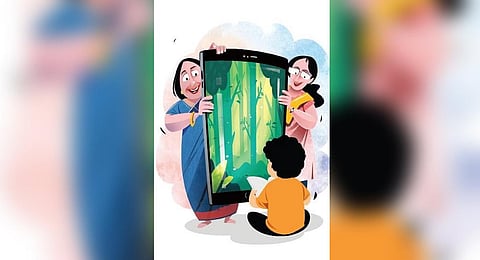

As a former health minister of Kerala, I have had the privilege of serving a state which is considered the very epitome of natural beauty while also confronting the catastrophic challenges thrown at us by nature itself. This dichotomy within which we function sheds light on the need to understand our environment and the opportunities it offers us, but also the need to prepare for the climate crisis at hand.
Take for instance, the deadly Nipah virus outbreak we faced in May 2018, followed by severe floods the same year. It was a shocking wake up call for Kerala and the entire nation. It was a moment that revealed the intersection of public health and climate change in stark terms.
The outbreak, which emerged from contact with infected animals, shook our communities. I witnessed first-hand the challenges of tackling a disease with complex transmission dynamics. Our containment efforts were recognised internationally, becoming an example on how to handle a health crisis. The experience also revealed an important interlinkage.
The Nipah virus outbreak was, in part, a manifestation of changing climate patterns. Both its emergence and spread can be linked to environmental disruptions caused by deforestation, rampant urbanisation, and agricultural practices that brought humans too close to wildlife. Climate change had exacerbated the changes in ecosystems, which in turn increased the likelihood of zoonotic diseases spilling over from animals to humans.
The outbreak was a startling display of how climate change could have a profound impact on public health. As if to reiterate this, less than two months later, Kerala witnessed ‘the flood of the century’.
It was a watershed moment for Kerala. Our government set up rescue efforts and rehabilitation centres with trained medical staff at breakneck speed, as we competed with the rising water levels. We immersed ourselves in data, figures and action over the state of our rivers, dam management, disaster preparedness and the quality of weather reports. We managed to bring the state back to its feet in record time but realised we need to be prepared if we were ever to face such a crisis again.
As a teacher who moved into full time politics, these two incidents have cemented a long standing belief. Climate education is urgently required to prepare our people for a world that will see more diseases and extreme weather events.
We need a population that is not only aware of the climate crisis but also equipped with the knowledge and skills to address it. Thus, we must prepare our youth for these challenges. Youth who will be taking up leadership of our state, the country and the world will have to understand the complex interactions between climate change and health. A well informed electorate can support policies and initiatives that aim to mitigate the impact of climate change and demand better adaptation efforts.
And who better to inform them than teachers? My own journey as an educator has convinced me of the profound responsibility that we bear and I believe teachers can be powerful advocates for climate action.
To effectively integrate climate education into the everyday learnings of our children, we must invest in training our teachers. This requires a dedicated set of educators who are already equipped with the understanding of the science of climate change, its implication on society and the effective methods to impart this knowledge to children.
Enter the Climate Educators Network, an entity formed by educators for educators with the sole purpose of improving climate education in India. Consisting of academicians, teachers, institutions and professors from across the country, the Network would promote the exchange of ideas, foster a sense of community among teachers dedicated to climate education and enable educators to stay updated on the latest developments in climate science, policy, and education techniques. The network is set to be launched on November 14, Children’s Day, and would serve as a platform for teachers across the spectrum to come together to share best practices, learn from experts in the field and have access to resources.
The integration of climate education into everyday learning can no longer be seen as an isolated event or just an extracurricular activity. It has to be a fundamental aspect of a well-rounded education.
By investing in teachers through the Climate Educators Network, we are sowing the seeds of a healthier, more resilient future for our children and youth. We can ensure that the challenges of yesterday become the learnings of today and the tools of tomorrow.
By K K Shailaja; The author is former health minister of Kerala